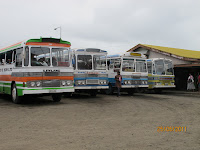 |
| David, Michael & Gloria |
We took a day trip on a local bus across Vanua Levu island from here in Savusavu to the main town of La(m)basa two hours north. Everything grows in great profusion on this island. It's warm, wet and the volcanic soil is fertile red. The trees are tall and draped with symbiotic plants. The Fijians are a tall, broad and handsome people with a friendly smile and hello for all and I believe are the minority to the Indian Fijians who were originally brought to these islands by the British to work in their sugar cane plantations. From what we've seen the groups mix well. The Indians are definitely the winners in commercial enterprise.
 |
| Bus station |
The houses we passed were simple wood and corrugated iron structures without fences but with tidy, tended gardens. Houses are tidy, junk yard abodes are infrequent. We saw some bicycles but not one motorcycle although the road is in good condition.
Labasa (pronounced Lambasa) is a market town by a river. A single high street of shops all selling the same ironmongery, the same saris, t shirts, video shops which seem to only stock violent films (not a strong market for the romantic comedy methinks) and at the head of the street is the bus station and the market. We wandered around and were warmly welcomed, never hassled or pressed, by the store owners. I can testify to the cleanliness of the public toilets – spotless for 2p to pee.
We'd gone on our day trip with Gloria and Michael of Paikea Mist and it was nice to share the day with them. We looked at the market, the shops, had lunch, more shops and still there were 2 hours to wait for the bus back. To fill the time we went to the local hotel and enjoyed a cold beer poolside.
The trip back left promptly at 4.15pm as advertised. While we'd been waiting for the bus to leave David and I had struck up a conversation with the Fijian lady, Siya and her 3 year old daughter, Viyana. Viyana was a giggling sweetheart who left her Mum to come and sit with us for all the journey home. She sat on my lap, David's lap, fell asleep on me and when she got heavy I passed her over to David. He was taken with the mite and carried her off the bus when they got off.
 | |
| David and Viyana |
No comments:
Post a Comment